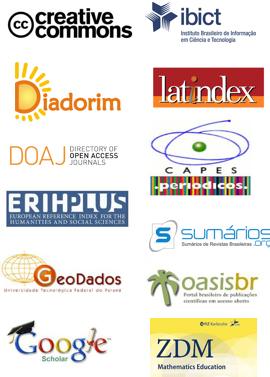A Construção de um Estado da Arte Sobre Introdução, Dificuldades e Perspectivas de Conceitos e Simbologias da Álgebra no Ensino Fundamental
DOI:
https://doi.org/10.17921/2176-5634.2023v16n3p330-342Resumo
Conhecer a produção científica sobre a introdução da Álgebra no Ensino Fundamental em processos de ensino e aprendizagem foi o tema de interesse deste Estado da Arte. Nessa direção surgiram questionamentos: como o estudante dos anos finais do Ensino Fundamental lida com a experiência do “mundo” das letras na Matemática? Que dificuldades ele apresenta para identificar e operar com símbolos além de números? Como se dá o processo da construção do pensamento algébrico? A partir de um cuidadoso processo descrito sobre a escolha das obras, construiu-se um corpus de análise com base na Biblioteca Digital Brasileira de Teses e Dissertações, consultadas desde os anos 2000 até hoje. Analisando-se criteriosamente oito dissertações, foram criadas duas categorias, a primeira evidencia aspectos relacionados a teorias de aprendizagem e a outra dá ênfase à argumentação algébrica. Nesse estudo observou-se que existe uma recorrência de referenciais teóricos que se complementam, e uma constante preocupação acerca do modo como a álgebra é colocada para os alunos no Ensino Fundamental. Em relação às dificuldades, destacam que a construção dos conceitos feitos pelos alunos está diretamente ligada ao modo como os mesmos são apresentados a eles. Direciona-se a necessidade de maior estabelecimento das relações e conexões entre aritmética e álgebra, a atenção com a transição entre linguagens (usual, simbólica, algébrica), a produção do significado algébrico para além da manipulação mecanizada de símbolos, o discernimento entre os vários e possíveis usos da variável e a busca por estratégias didáticas com vistas à construção do pensamento algébrico.
Palavras-chave: Introdução à Álgebra. Pensamento Algébrico, Estado da Arte. Aprendizagem. Ensino Fundamental.
Abstract
Knowing the scientific production about the introduction of Algebra in Elementary Education in teaching and learning processes was the theme of interest of this State of the Art. In this direction, questions arose: how do students in the final years of elementary school deal with the experience of the "world" of letters in mathematics? What difficulties do they have to identify and operate with symbols other than numbers? How does the process of building algebraic thought take place? From a careful process described on the choice of works, a corpus of analysis was built based on the Brazilian Digital Library of Theses and Dissertations, consulted since 2000 until today. By carefully analyzing eight dissertations, two categories were created: the first highlights aspects related to learning theories and the second emphasizes algebraic reasoning. In this study, it was observed that there is a recurrence of theoretical references that complement each other, and a constant concern about the way algebra is presented to students in Elementary School. Regarding the difficulties, they highlight that the construction of the concepts made by the students is directly linked to the way they are presented to them. It addresses the need for greater establishment of relationships and connections between arithmetic and algebra, attention to the transition between languages (usual, symbolic, algebraic), the production of algebraic meaning beyond the mechanized manipulation of symbols, discernment between the various and possible uses of the variable and the search for teaching strategies with a view to building algebraic thinking.
Keywords: Introduction of Álgebra. Algebraic Thinking, State of art. Learning. Elementary Education.


